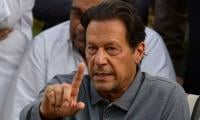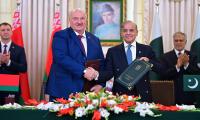RIYADH: Saudi Arabia on Tuesday approved a budget for 2025 that projected a deficit of $26.8 billion as high spending continues on reforms meant to transition the economy away from oil.
The expected deficit, amounting to 2.3 per cent of GDP, is down from a 2024 deficit of $30.6 billion, or 2.8 per cent of GDP, according to the budget published by the finance ministry.
The world’s biggest oil exporter and the Middle East’s largest economy estimates that GDP will have grown by 0.8 per cent in 2024, “driven by an increase in non-oil activities, which are expected to grow by 3.7 per cent”, the ministry said.
Non-oil activities in 2024 offset declines in oil revenues because of lower prices and output, it said.“This reflected the success of economic diversification, making the Saudi economy less reliant on the oil sector.”
The economy is expected to grow by 4.6 per cent in 2025, it said.Crown Prince Mohammed bin Salman, Saudi Arabia’s de facto ruler, is pursuing an expensive reform agenda known as Vision 2030.
It includes projects such as NEOM, a planned futuristic mega-city in the desert, and resorts along the Red Sea coast meant to draw tourists to the formerly closed-off kingdom.At the same time the OPEC+ bloc of oil producers -- which Saudi Arabia co-leads with Russia -- has implemented a series of production cuts since 2022 in a bid to boost prices.
Saudi Arabia is currently producing roughly nine million barrels per day (bpd), well below its capacity of 12 million bpd.In 2022, Saudi Arabia recorded its first budget surplus in nearly a decade after Russia´s invasion of Ukraine led to a surge in oil prices.
But last year’s budget signalled a return to deficits, with Finance Minister Mohammed al-Jadaan saying at the time that this was the product of a deliberate decision to boost spending.
The image shows entrance of the Indus Motor Company. — APP/FileKARACHI: Indus Motor Company Limited has announced to...
View of the KE headquarters in Karachi. — Facebook@K-Electric/FileKARACHI: Kot Addu Power Company Limited has...
A salesperson displays gold jewellery at a store in this undated file photo. — AFP/FileKARACHI: Gold prices...
Indian billionaire Gautam Adani speaks during an inauguration ceremony after the Adani Group completed the purchase of...
US President-elect Donald Trump attends the America First Policy Institute gala at Mar-A-Lago in Palm Beach, Florida,...
A representational image showing an oil refinery. — AFP/FileLAGOS: Nigeria’s national oil company began operating...







